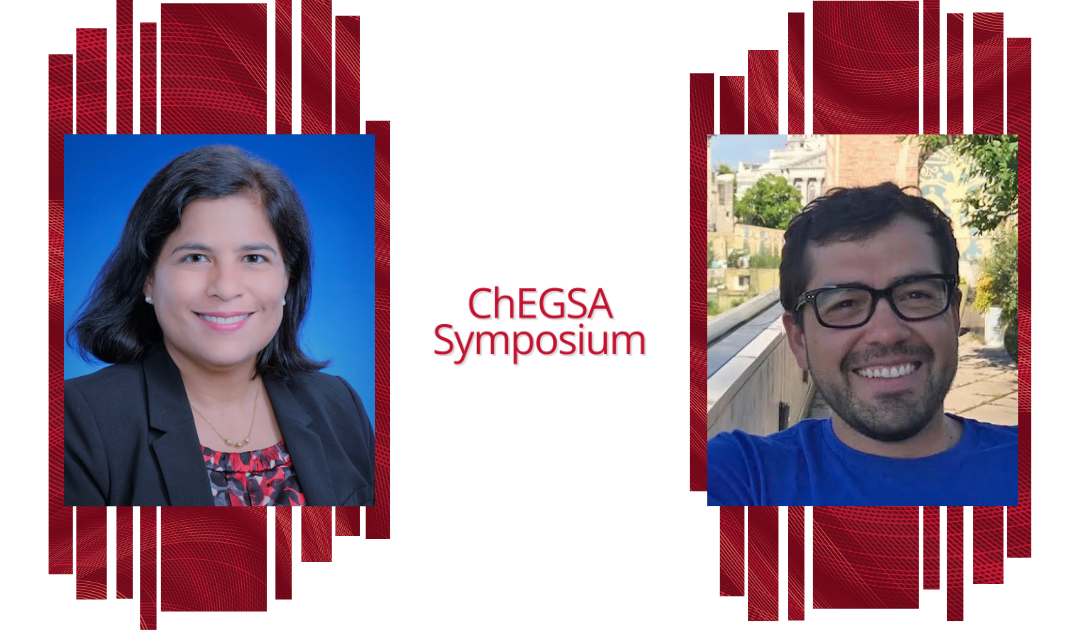In keynotes, alums share careers with purpose and impact
Lia Gold-Garfinkel
Oct 31, 2024

Two chemical engineering alums returned to campus to deliver the keynote addresses at the 46th Chemical Engineering Graduate Student Association (ChEGSA) Research Symposium. Both Celia Cruz ('99) and Victor Zavala ('08) encourage current students to think of purpose and impact when looking ahead to their careers.
"Understand how you fit in the big picture of society," Zavala says, "and how as an engineer you can solve problems to create social impact." Cruz reminds students that as engineers, they make things. Therefore finding ways to make things that help people and the environment, and understanding that these products have an impact on the world, is crucial to connecting oneself to one's work.
Cruz began her career in the pharmaceutical industry. Her first job, at Merck, gave her the opportunity to learn about design and manufacturing. Then she worked for the US Food and Drug Administration (FDA), helping to create new policies concerning developing drugs and technologies.
After working with the FDA for nine years, Cruz returned to industry as vice president of small molecule development and commercialization with Eli Lilly and Company. In addition to leading teams in the chemical processes, Cruz is involved in product development of tablets and capsules. "It's been a really fulfilling choice for me in terms of the purpose of my career," Cruz says.
She advises students not to limit themselves to one industry. "Talk to people who do different aspects of chemical engineering," she encourages. "Think of purpose. In what areas do you want to make a difference?"
Cruz's ability to combine technical knowledge with policy started at Carnegie Mellon, where she took courses in policy and ethics. She enjoyed the freedom to pursue classes in other disciplines. "I felt a spirit of collaboration, entrepreneurship, and more importantly, interdisciplinary work," she recalls of the culture of graduate students and the approach to teaching at CMU.
At CMU, I felt a spirit of collaboration, entrepreneurship, and more importantly, interdisciplinary work.
Celia Cruz, VP of small molecule development and commercialization, Eli Lilly and Co.
Cruz remembers Spyros Pandis, her advisor, encouraging students to combine lab work, field work, and modeling, and Ignacio Grossmann, then department head, supporting students in pursuing scholarships and helping with career strategies.
Faculty mentors also influenced Zavala's path. He first heard about CMU when Larry Biegler gave a presentation on process systems engineering (PSE) at Zavala's undergraduate school, the Universidad Iberoamericana in Mexico City. PSE was a field Zavala was particularly interested in pursuing, and he came to CMU to study with top PSE researchers, including Biegler, who became his advisor.
Zavala says Grossmann also became a role model for him, "from a personal perspective and also from a professional perspective." Both Zavala and Grossmann are originally from Mexico, and Zavala points out that for international students especially, finding mentors and an inclusive environment is crucial. Recalling the diversity of the Department of Chemical Engineering, Zavala says, "there were people from all over the world, so it was easy to form a community."
Biegler and Grossmann inspired Zavala to pursue his current position, Baldovin-DaPra Professor in the Department of Chemical and Biological Engineering at the University of Wisconsin-Madison.
Prior to that, Zavala worked at Argonne National Laboratory, first as a postdoctoral researcher and then as a staff scientist (a computational mathematician). His work consisted of identifying ways in which renewable energy could be incorporated into the market. Zavala also worked on a number of infrastructure projects, focusing on the optimization of buildings and of natural gas networks.
Zavala explains that CMU gave him specific computational and chemical engineering knowledge, as well as a "big impact" approach to projects. To him, that has meant identifying problems in the world and finding the ways in which one can make the biggest impact when solving them.
He advises students to master foundational concepts, which they will be able to apply to any number of industries in the future. Both Cruz and Zavala emphasize the fluidity that a degree in chemical engineering offers and the many opportunities for chemical engineers to make the world better.
